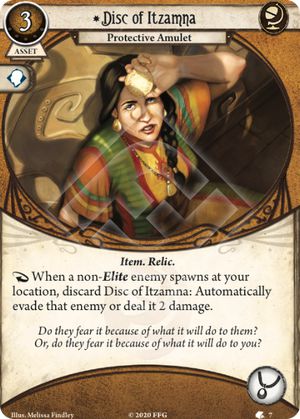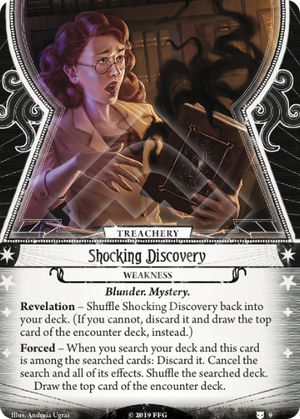
Q: Pretty sure I know the answer, but is "heal" a protected verb (e.g. A card effect must explicitly say "heal" in order to prevent the forced effect here), or do all means of removal qualify as healing? (e.g. Tommy Muldoon's elder sign effect)

Q: Pretty sure I know the answer, but is "heal" a protected verb (e.g. A card effect must explicitly say "heal" in order to prevent the forced effect here), or do all means of removal qualify as healing? (e.g. Tommy Muldoon's elder sign effect)

This has been updated to match my "Signature Weakness Project." I have done my best to make sure that the original content isn't altered too much, out of respect for any comments.
Another enemy signature weakness. Looking at the two elements, the effect and the discard condition, we get:
The effect: This thing attacks Norman keeps him from drawing or revealing cards, messing with, but not completely negating, Norman's special ability. This is not a terribly difficult enemy to kill, even for Norman. In a previous review, people pointed out that it's not a hunter, so, if Norman can Evade it (or someone else engages it and Evades for him, it stays in its starting location, which might effectively put it out of play. However, with it's Evade of 3 and Norman's of 1, this is not going to happen naturally. Mists of R'lyeh could do the trick, but combat seems a better option, since Norman is even up with the Hound, even during his opening round ((Norman is unique so far that he can draw his signature weakness first turn. It's not likely, but it's Arkham). As Norman gains XP, his damage-dealing options become too numerous to mention, but, at 0 XP he is very fragile until he gets set up. Knife seems to be his traditional solution to an early Hound. It's cheap and he can throw it, getting 2 up on his test and killing the Hound if he hits. Enchanted Blade is more expensive, but it's more or less 3 thrown knives with some extra utility. Sword Cane is very attractive, since it can be kept in hand for the Hound's appearance and might be his best shot for that Evade attempt. It will take twice as many attacks to finish it, which might strain Norman's luck if he can't boost his . It's possible to get a perfect storm of a bad opening hand + the Hound on top of the deck, but that's pushing "situational" a bit far.
The discard condition: As usual with enemy weaknesses, kill it.
All in all, this is a below average signature weakness, maybe even way below on Easy or Standard.
Box vs book The Hound is a pretty easy weakness, but Split the Angle seems to get used for icons more often than it is played, so the "box" set is better, although you can run both without too much trouble.

If I use the disc on a deep one that is spawning on me does it ever engage me or does the when interrupt it fast enough to prevent the enemy to have been considered engaged with me? (either by evading it or dealing it 2 damage and killing it)

Another enemy weakness, which are usually pretty tame. Looking at the two elements, the effect and the discard condition, we get:
The effect: An enemy that needs killing, which is, ironically, just what Tony likes to do. It even comes with it's own bounty, so Tony can engage it for free. It's 4 combat, which is stronger than most enemy signature weaknesses, but Tony should be prepared to dish out 3 damage to such an enemy, and if he's using Tony's .38 Long Colt, it boosts him and rewards him for the kill. It would be a signature asset if it didn't come in with a Doom on it, which makes it a weaker Ancient Evils that you can cancel if you are fast enough or if it gets drawn during the Witching Hour. It has the usual "loophole" that any investigator can deal with it, although the Quarry's Aloof keyword makes that less appealing than some of the "on the board" weaknesses. If you are on a small map, killing this maybe a turn and change. In a larger map, you might just want to take the Doom hit or deploy cards like Nimble (although Tony will need some boosts before that's going to happen) or Elusive to get close, if not in, the space.
The discard condition: Kill it, if you don't feel like ignoring it.
Taken together, this is a below average signature weakness, which is almost more a benefit, except for the slim possibility of Dooming out a scenario.

A unique, flavorful, and annoying weakness. Looking at the two elements, the effect and the discard condition, we get:
The effect: only goes off during a search, cancels the search entirely, and you draw an encounter card. Another very situational card. It can wreck your plans or kind of fizzle. I mean, you could build a Mandy deck with no search effects beyond her . You'd be abandoning her ability and signature asset, but you'd also neutralize her signature weakness, making her kind of a bland "generic seeker." That's not a good idea, mind you, but I am not sure there is another investigator who can render her signatures irrelevant, so that's one mitigation strategy....
More practically, you want to find a big search card to draw this out. Like thakaris, I think Research Librarian is probably your best choice to "rip off the band-aid" and get this out of the way early. (I'm also very impressed by their subversion of Treacheries, but, Arkham being Arkham, you would probably draw one of them as your draw from Shocking Discovery instead of before it.) Another strategy is to use Whitton Greene to dig for, say, Segment of Onyx. Since her search ability is limited by revealing locations, it hurts less than searches driven by card play or secrets. Cards like No Stone Unturned (5) are pretty expensive to spend on a wasted action and an encounter card. Depending on your "off class," Mandy has some ability to cancel or redirect the errant encounter card as well.
The discard condition: It discards itself.
All in all, this is a below average signature weakness, maybe even way below.